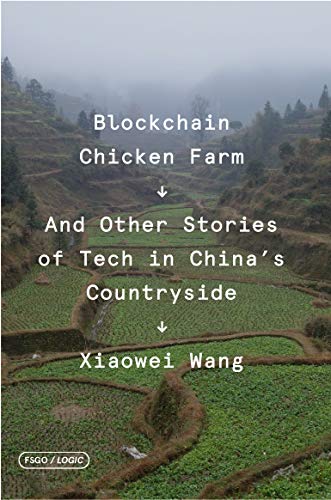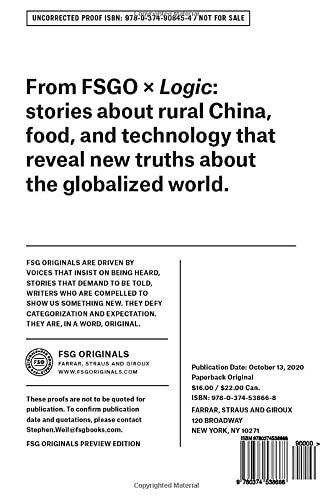Customer Services
Copyright © 2025 Desertcart Holdings Limited
Desert Online General Trading LLC
Dubai, United Arab Emirates



Blockchain Chicken Farm (FSG Originals x Logic)
T**Y
The author lacks logic and reasoning
It begins as non-biased as possible with an introduction on how technologies and humans interact. I thought this was going to be a very matter of fact book with incredibly articulate writing from the author. The way she describes a smart phone as, "The darkened screen beckons to me, reflecting back like an ancient scrying mirror, a device used for divination, a mirror on which to project all our desires," was a way no one would have used to picture a smart phone but everyone who read it would intuitively understand. One of the author's goal with her arguments was to avoid criticism of technology because there are two sides to every story. What may be good for you may not be good for me. If the author had stuck with this format, the book would have easily been awarded 5 stars.Unfortunately, right after the introduction, the irony and failures begin. She criticizes American capitalism and free market while being a CCP apologist. While recalling her third day of her visit, she explains the debilitating and harsh caste system in China called, the hukuo, in which your social program benefits are determined by your ancestral home. Someone, by default, who was born in a big city gets more benefits than someone who was born in a small village. This limits a Chinese from success because it creates distinct class difference that favor certain people based off of nothing more than where they were born. But for whatever reason, she proceeds to criticize the success of the United States for having similar class systems and being able to extort the labor of lower and poorer classes. She does so without providing an ounce of evidence of any similar laws in the United States.The author is very critical of the free market, using words to describe it like delusion and eerily. According to her, market forces create problems of food safety and it should be up to the government to mediate social trust and regulate to protect its people. She is critical of the free market even though as she provides a plethora of evidence of how the free market is giving consumers trust in food safety with innovations from informatics and sensors being provided by market forces such as Alibaba, fitbits for chickens and Bits X Bites. On the other hand, zero evidence toward her statement that the government can be the ones to create social trust.I don't get this author. The author does a great job summarizing the disastrous results of Mao's Socialist China in the Great Leap Forward when millions starved, including her great uncle, because of collectivized farming - an obvious form of socialism. Where her great aunt lost a limb because educated doctors were sent to reeducation camps and the only 'doctors' left were young students who gave faulty medical advice - an example of demonizing the competent and successful in favor of the incompetent and unsuccessful. And yet, the author cannot put two and two together, lacking logical reasoning, and demonizes blockchain innovators - competent and successful - and essentially the free market, for making food a commodity instead of a 'human right.' I'll end this review with a quote that she begins the book with, "Nationalist dreams stand, dull and mute, nothing more than a point between dream and illusion." (p29)
J**N
The Long Tail of Globalisation
I have bought this book out of curiosity, in hopes to learn how rural lives in China are touched by the internet-era technology. “Blockchain” had its effect too, lending some aura of science fiction to the title. I can assure you, though, that reading this book is not like having an SF novel in your hands. Apart from a few “what-if in near future” chapters (e.g. on moon cakes from crops cultivated on the Moon) the book is nonfiction, showing vignettes of farmers-turned-entrepreneurs selling their goods on Chinese enormous online retail platforms. Readers, almost surely reliant on Internet shopping, get a chance to see what life looks like on the other side of global supply chains. And, aside from cultural differences, they will find it similar to theirs - dependent more and more on the gig economy controlled by a few tech giants; life surveilled, modelled and monetized. Tech and capitalism truly do the same wonders everywhere.Xiaowei Wang writes stories with cultural sensitivity and keen eye to details. More often than not, I felt as a companion taking part in the journey. The journalistic parts of “Blockchain Chicken Farm” - interviews and descriptions - are the most solid. I had less pleasure in reading the philosophizing passages with which the book is interspersed. While most observations are spot-on (I loved "conspiracy, the last refuge of personal agency"), some of them are rather kitschy platitudes. Or, maybe I am not poetic enough to digest them? Nonetheless - the book is surely worth your time.P.S. As of the blockchain chickens... quite predictably it turned out to be yet another inconclusive pilot project riding on the blockchain’s true power - marketing.
K**T
Superbly Done, Provides a Real Feel for the Changing Rural Countrside
I’m an old guy that’s discovered traveling in rural western China, specifically Hubei, Hunan, Sichuan. Occasionally one comes upon one of these villages, sprung from essentially Iron Age technologies to entire villages powered by vast solar arrays, it’s mind boggling. The author provides a genuine feel for it in this excellent book. I can’t recommend it enough.
W**R
Warm, fun, takes me to places I could never go
I really enjoyed this book. I was somewhat aware of tech startups in China's urban areas (I work in a US startup and I used to be an Amazon developer, years ago) but I had no idea that this reaches out into the countryside. The Chinese government wants some of this investment to get into the countryside but it also wants a lot of people in the countryside to stay out of the cities. So there are enterprises in the countryside such as the blockchain chicken farm mentioned in the title (which I thought was a joke until I read the book). They sound crazy... but lots of US startups are crazy, too.
N**N
Mind-expanding, brilliant nonfiction, a perspective unlike any other.
My copy is as dog eared as any book I've ever owned. All kinds of fascinating windows into a completely different world, and one very few Americans will ever get to see - the halls of tech power in China, and how the rapidly accelerating tech scene in China is playing out in rural villages. Very relevant for me as a rural development professional here in the US as well - a cautionary tale and an inspiration all in one.
A**N
A wonderful story about connections
Blockchain Chicken Farm is an engaging collection of stories about China’s countryside and technology. The book does a fantastic job at exploring technology, culture, globalization and what makes all of us fundamentally human.As someone who works in tech and lives on the west coast of the US, this book gave me a nice window into what’s happening on the other side of the world.
J**Q
Good read, finished in a day
The book is an easy read and elicits a familiar sense of nostalgia for a place that I've never been to.
M**G
Lots of knowledge. Fresh perspective on the mingling of Chinese culture and modern technology.
Very informative. Can't wait for the next one.
G**G
How China is advancing from a medieval society to a hi tech society in one giant leap
This was particularly interesting to me as I have spent some time in China and could visualise many of the settings which the author describes. I found the book to be very interesting and informative, although it did enhance my already formed view that we, in the west, have no chance of competing with the Chinese model of business.The book held my attention throughout and so I guess it must be considered well written, even though the reader will doubtless learn a plethora of new words they had never encountered before and I doubt are in the current dictionary. However, I was left awestruck by the linguistic dexterity of someone for whom I didn’t expect English to be their first language.
B**O
A window to the intersection of technology, rural life and culture shift
This is a book I read vs scan. Every sentence crafted, with substance and beauty. The writer paints the scene with words, demanding attention and involvement. This book might be about China and tech in rural areas but so much of it rings true and resonates.
J**S
Take a new look at China, at digital technology and at yourself
Very good storytelling. Xiaowei Wang weaves together vignettes about blockchain, AI , e-commerce, drones and social media while focussing on their applications to rural China. Behind that they ask important questions about Silicon Valley and Chinese culture. Really thought provoking and recommended.
W**S
Another side of China
The author relates stories of a side of China that has received little attention until now and which is quite interesting: people living in the countryside who are creating innovations as well as 社会人, Chinese who don't care about achieving great careers or even middle class mediocrity. However, the author herself seems very concerned about making it in the high-tech world (of California?) and is addicted to consumption, which she does not handle critically in her own case. She confuses the terms "gourmand" and "gourmet", but otherwise the book is well written.
R**N
Christmas tree
Didnt like it so sent it back, at our cost, and then Canada post lost it. Not a happy experience.
Trustpilot
2 weeks ago
2 weeks ago